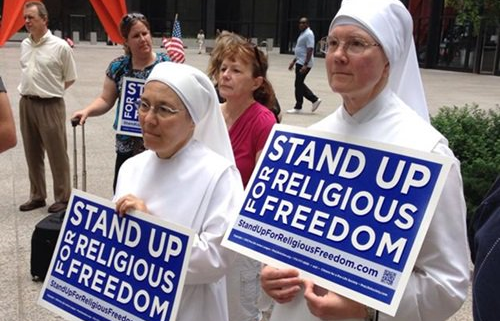The Little Sisters of the Poor are back in court again fighting against pro-abortion politicians who want to force the nuns to pay for birth control, including forms that may cause abortions, in their employee health plans.
Health Affairs reports the nuns received permission to intervene in the case California v. Trump on Dec. 29. California and several other states are challenging the Trump administration’s decision to grant broader exemptions to religious employers who oppose the birth control mandate in the Affordable Care Act.
The new exemption provides relief to groups like the Little Sisters and Hobby Lobby, which were forced to challenge the mandate to the U.S. Supreme Court or face crippling fines. The Little Sisters of the Poor are Catholic nuns who dedicate their lives to caring for the elderly poor.
However, state attorneys general in California, Pennsylvania and several other states challenged the new exemption. In mid-December, a federal judge blocked the Trump administration from allowing the exemption to go into effect.
Then, last week, Judge Haywood Gilliam granted the Little Sisters’ petition to intervene in the case.
The Little Sisters of the Poor, represented by attorneys with the Becket Fund for Religious Liberty, are asking the court to ensure that they can continue their vital ministry of caring for the elderly poor without violating their faith.
According to the report:
Judge Gilliam held that the Little Sisters did not have a right to intervene, as their interests were adequately represented by the Trump Administration. He did, however, grant them permission to intervene, recognizing that they had a strong interest in the outcome of the case. At the instance of the plaintiffs, Judge Gilliam ordered the Little Sisters not to raise new issues, delay the case, or require duplicative discovery.
“Sadly [state Attorneys General] Josh Shapiro and Xavier Becerra think attacking nuns is a way to score political points,” said Mark Rienzi, senior counsel at Becket, in November. “No one needs nuns in order to get contraceptives, and no one needs these guys reigniting the last administration’s divisive and unnecessary culture war.”
Follow LifeNews.com on Instagram for pro-life pictures and the latest pro-life news.
Earlier this fall, even the Pennsylvania attorney general challenging the rule admitted that the mandate under pro-abortion President Barack Obama was “extremely narrow.” It was so narrow that even the Little Sisters of the Poor had to fight the whole way to the U.S. Supreme Court for relief.
Other states that are suing the Trump administration include Massachusetts and Washington, according to the AP.
The Trump administration said the new rules are motivated by “our desire to bring to a close the more than five years of litigation” over the pro-abortion mandate. These include cases by the Little Sister of the Poor, Hobby Lobby and countless other religious organizations and businesses.
According to TownHall, the new rules provide significantly expanded religious exemptions that the Obama administration refused to offer.
One of the new rules, according to the Times, provides an exemption to employers or insurers that object to covering birth control “based on its sincerely held religious beliefs,” while another rule gives an exemption to employers with “moral convictions” against covering birth control.
The new rules state that since all religious objections to the contraceptive coverage mandate cannot be satisfied, “it is necessary and appropriate to provide the expanded exemptions.”
The Trump administration also notes that there are other means of acquiring birth control.
“The government,” it says, “already engages in dozens of programs that subsidize contraception for the low-income women” who are most at risk of unplanned pregnancies.
The controversial mandate twice made it to the Supreme Court where the high court sided with both Hobby Lobby and Little Sisters of the Poor.
The court ruled that Hobby Lobby and similar businesses were protected by the Religious Freedom Restoration Act of 1993, which states that an individual’s religious expression shouldn’t be “substantially burdened” by a law unless there is a “compelling government interest.”
In the Hobby Lobby ruling, Supreme Court Justice Samuel Alito wrote that the ACA’s contraception rule “would put these merchants to a difficult choice: either give up the right to seek judicial protection of their religious liberty or forgo the benefits, available to their competitors, of operating as corporations.”








